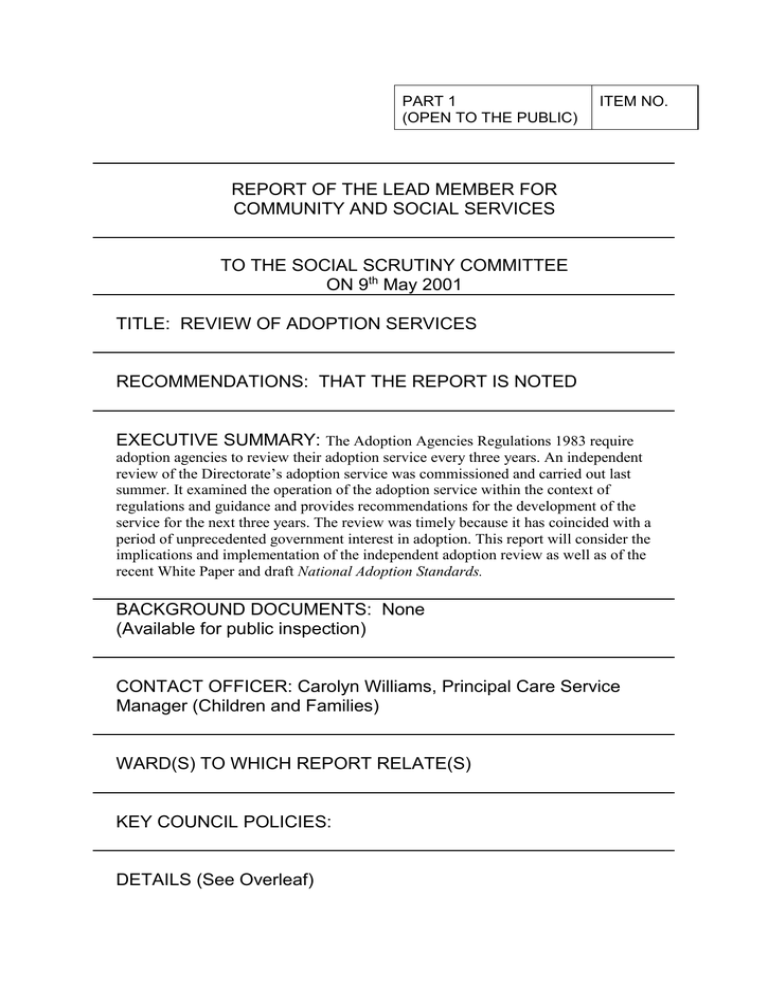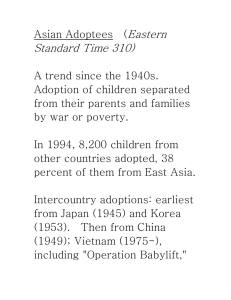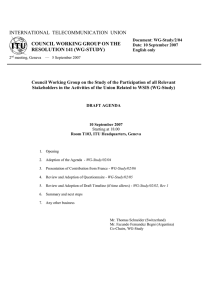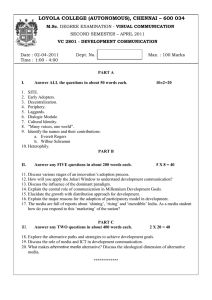REPORT OF THE LEAD MEMBER FOR COMMUNITY AND SOCIAL SERVICES
advertisement

PART 1 (OPEN TO THE PUBLIC) ITEM NO. REPORT OF THE LEAD MEMBER FOR COMMUNITY AND SOCIAL SERVICES TO THE SOCIAL SCRUTINY COMMITTEE ON 9th May 2001 TITLE: REVIEW OF ADOPTION SERVICES RECOMMENDATIONS: THAT THE REPORT IS NOTED EXECUTIVE SUMMARY: The Adoption Agencies Regulations 1983 require adoption agencies to review their adoption service every three years. An independent review of the Directorate’s adoption service was commissioned and carried out last summer. It examined the operation of the adoption service within the context of regulations and guidance and provides recommendations for the development of the service for the next three years. The review was timely because it has coincided with a period of unprecedented government interest in adoption. This report will consider the implications and implementation of the independent adoption review as well as of the recent White Paper and draft National Adoption Standards. BACKGROUND DOCUMENTS: None (Available for public inspection) CONTACT OFFICER: Carolyn Williams, Principal Care Service Manager (Children and Families) WARD(S) TO WHICH REPORT RELATE(S) KEY COUNCIL POLICIES: DETAILS (See Overleaf) INTRODUCTION The Adoption Agencies Regulations 1983 require adoption agencies to review their adoption service every three years. Although Salford had been an adoption agency since 1985 no systematic, formal review had ever taken place. Quality Protects Management Action Plans had identified the necessity for a review, not only to meet this legal requirement, but also as part of the strategic planning process for children’s services, to sit alongside the review of the fostering service in 1999, the independent report commissioned during 2000 regarding thresholds for the looked after system, and work on eligibility criteria for the social work service. Thus, an independent review of the Directorate’s adoption service was commissioned last summer. The review was timely because it has coincided with a period of unprecedented government interest in adoption. The publication of LAC 98 (20), “Adoption- achieving the right balance”, was followed by a Social Services Inspectorate survey in July 1999 into its implementation and impact, and a report, “Adopting Changes: Survey and Inspection of Local Councils’ Adoption Services”, in November 2000. Improved adoption services have been a Quality Protects priority and Quality Protects Management Action Plans have included information on the quality and management of the adoption service. The information gathered highlighted widespread variation in the use of adoption by councils, concerns about the planning and management of council adoption services, and processes in which delays were endemic. Alongside these findings is widespread concern about whether the best use is being made of adoption to meet the needs of those looked after children requiring permanent homes with new families. Despite initiatives to improve outcomes for children looked after by local authorities, for many children, who cannot return home to their parents, the care system cannot provide the chance for long-term family life. Research shows that children who are adopted do consistently better than children who remain in the care system. As a result, last year, the government, led by the Prime Minister himself, conducted a fundamental review of adoption policy and practice, which identified problems with the way the adoption sytem currently operates. The Performance and Innovation Unit report that followed made wide-ranging recommendations for Government action to improve adoption and to deliver permanence for looked after children. The White Paper, “Adoption - a new approach”, published in December 2000, sets out a plan to transform adoption services to provide many more looked after children who cannot return to their own families with the opportunity for stable, permanent family life. It includes the Government’s plans for the most radical reform of adoption law for 25 years and a comprehensive overhaul of the court system for children’s proceedings. New National Adoption Standards have also been issued for consultation. These set out what children, prospective adopters, adoptive parents and birth families can expect from the adoption process and the responsibilities of adoption agencies and councils. The new “Adoption and Children Bill” was published in March 2001 and has had its second reading in the House of Commons. This report will consider the implications and implementation of the independent adoption review as well as of the White Paper and draft National Adoption Standards. REVIEW OF THE ADOPTION SERVICE The review was externally commissioned due to constraints on the Family Placement service and the benefits an objective evaluation of the service would confer. It was carried out by Ms. Kathy Mann, an independent social work consultant with extensive experience of social work services for children and families, including both managing and inspecting local authority adoption and fostering services. Ms. Mann’s role as independent chair of the Directorate’s Adoption Panel afforded her additional insight into issues specific to Salford City Council. The review took place during August and September 2000. The objective was to ensure that the City Council is equipped to fulfil it statutory duty to provide a comprehensive adoption service which meets the needs of children who have been or may be adopted, their birth relatives and prospective or actual adopters. It examined the operation of the adoption service within the context of regulations and guidance and provides recommendations for the development of the service for the next three years. The review focused on areas for consideration identified by managers of the adoption service, using published standards and criteria from the SSI report, “For Children’s Sake: an Inspection of Local Authority Adoption Services”. Methodology included consideration of written materials, including Directorate policies, procedures and plans, interviews with Family Placement, fieldwork and administrative staff and managers, interviews with the Director of Community and Social Services, the lead member for social services, senior managers and adoption panel members, interviews with service users, a postal survey of service users, and an inspection of a sample of files. Summary of findings Overall the findings of the review were positive and a number of areas of good practice were highlighted: Overarching strategic plans included reference to adoption. Adopters were positive about their approach to the agency and well prepared. Adopters described the placement process as supportive and were provided with relevant information. Some post placement and post adoption support was available. The matching and placement process was a particular area of good practice. Relationships with other agencies were good. The adoption panel functioned well and had good relationships with the local authority. Staff were committed to providing a quality service to all involved with the adoption process. A number of key areas for improvement were also identified: The service was struggling to meet the demand of a rising number of children needing adoptive placements. A staffing review was needed to equip the service to meet the targets in the Quality Protects Management Action Plan and future Government requirements. Strategic planning for the total development of the adoption service was limited and urgently needed for the service to meet the challenges of national developments. Recruitment of adopters did not meet demand and needed to be expanded. A policy on adoption did not exist. Adoption procedure needed to be updated and brought into the mainstream of child care. More information could be made available to elected members. Improvements could be made in birth parent counselling. The review report contains a substantial number of recommendations. An implementation plan is appended to this report detailing the Directorate’s response. In addition to addressing the issues raised by the review, work will need to be undertaken in relation to the adoption White Paper, draft National Adoption Standards and the “Adoption and Children Bill” currently before parliament. THE ADOPTION WHITE PAPER The White Paper, “Adoption – a new approach”, published in December 2000, presents the Government’s vision of a new, modernised adoption service. It sets out the Government’s plans to promote greater use of adoption, particularly for children looked after by local authorities, improve the performance of adoption services, and put the needs of children at the centre of the adoption process. Draft National Adoption Standards accompanied the White Paper. Consultation on these has now ended and publication of the final standards is imminent. Indications from the consultation exercise are that, although many local authority adoption agencies felt the standards would raise resource issues, there is likely to be little change from the draft document. Key proposals Investment of £66.5m over three years, mainly delivered through the Quality Protects grant, to improve services and support for children and their adoptive families. A new national target to increase by 40% by 2004-2005 the number of looked after children adopted, and aim to exceed this by achieving, if possible, a 50% increase. New National Adoption Standards which set out what children and parents involved in the adoption process can expect, and what the government expects of councils and adoption agencies. Senior managers to ensure adoption is an integral part of services for children. Timescales for children so that a sound plan for their permanent future will be made within six months of starting to be continuously looked after, and implemented promptly. Where a decision is made that adoption is the plan a new family should be found within a further six months. Timescales for the assessment and approval of adoptive parents to reduce delay, including timescales for panel recommendations and agency ratification of decisions. Plans for children and their timescales to be monitored by a designated manager on a case-by-case basis. A national Adoption Register to match children with adoptive parents across the country where a local family cannot be found. An expectation that most local authority adoption agencies will operate in consortia to allow the widest choice of placements to be available. An Adoption and Permanence Taskforce to tackle poor performance and spread best practice. New emergency powers to intervene where agencies are not delivering a satisfactory adoption service. Councils will be encouraged to reorganise their services for permanence to ensure that targets and timescales are met. A new right for prospective adopters to an independent review if the agency plans to reject their application. Changes to the assessment process to make it transparent and fair. All families adopting children, whether they have been looked after or not, will have a right to an assessment for post placement support. Councils will be required to provide a full package of post adoption support services, including, where appropriate, financial help. A new, fair and flexible legal framework for adoption allowances. New entitlements to paid adoption leave. Changes to the court system to increase the number of judges available for family work and reduce delay. Pilot specialist adoption centres to improve expertise and increase flexibility. Delivery Plan The final vision involves an enormous agenda for change within a very short timescale. Spring 2001 Summer 2001 Autumn 2001 During 2001 Quality Protects funding to improve adoption services. Confirm National Adoption Standards Consult on Code of Practice Award contract for national Adoption Register Begin work on consortia Adoption Register operational Recruitment initiatives Review of panels and assessment processes Encouragement for improvements to post adoption services Improve recruitment and assessment process Publish Code of Practice New legislation Improve recruitment and training of social workers Guidance on issues in White Paper Pilot changes to court system Implications for the Directorate Target to increase the number of looked after children placed for adoption During 1999-2000 2.8% of looked after children in Salford were adopted. This represented an increase on the previous year, despite the rise in the number of looked after children, but still fell short of the Metropolitan average figure of 4%. Early indications are of a further increase. However, given the recent focus on adoption and efforts by local authorities to improve their performance, it is likely that the average figure will rise proportionately. During 2000-2001, 42 children were agreed as in need of adoptive placements and 22 children were placed for adoption. Local authorities are encouraged to promote the use of adoption as a positive option for children who cannot return home. The review of the adoption service has identified ways in which this can be achieved. Timescales for planning and placement of children Timescales for assessment and approval of adopters Management monitoring of planning and timescales National Adoption Register and expectation that agencies will work in consortia However, provision of placements even at the current level has stretched the adoption service. Demand has outstripped the supply of adopters with particular difficulties in finding placements for older children, children with disabilities and sibling groups. Increase in the number of placements will require a coordinated recruitment strategy and a substantial increase in the staff time available to support and plan recruitment activity, undertake family finding for specific children, process applications, follow through the matching process and provide post placement and post adoption support. The additional post for adoption recruitment in this year’s Quality Protects Management Action Plan will begin this process. It is the Directorate’s view that this would best be achieved by the creation of a specialist adoption team but progress will be dependent on the Directorate’s ability to make further investment in the adoption service. The achievement of the stringent timescales proposed will have resource implications for both the fieldwork teams and the Family Placement service. At present the average time a child spends looked after before a permanency decision is made is 16 months. The proposed timescale is 6 months. The current time spent looked after before placement for adoption averages 23 months. The proposed timescale is 13 months. Although delays in the court process are a contributory factor, there is no doubt that the timescales proposed represent a considerable challenge. From the point an application is made the average time taken for completion of the assessment process and a recommendation at the adoption panel is currently 10 months. The proposed timescale is a maximum of 6 months. Delays are caused by the pressure of other work and the lack of staff time to undertake assessments, which mean that applications cannot be allocated promptly. Ring fenced time for adoption work will be necessary if target times are to be achieved. Additional administrative time will be needed to establish and maintain monitoring systems. Management monitoring on a case by case basis will be time consuming Salford is not part of the Greater Manchester Fostering and Adoption Consortium. Membership has been explored but other consortium agencies feel that the volume of placements that would be needed by a local authority with a large number of looked after children would overwhelm the system. Discussions are taking place with Manchester City Council Social Services Department with a view to establishing a consortium Right to assessment for post placement support Availability of post adoption support services New framework for adoption allowances arrangement between the two authorities. The requirement to make use of the National Adoption register to identify placements for children is likely to increase spending on inter-agency placement fees, and placement of children in other parts of the country will have implications for social workers and family placement workers. This new right will have resource implications particularly as it extends to placements of children who have not been looked after and who would not currently meet the eligibility criteria for social work services. Post adoption support services currently available are piecemeal. There will be a need to coordinate the services available and develop new services to meet the specific needs of parties to the adoption process. Services must be developed jointly with the LEA and NHS. Efforts are being made to identify alternative sources of funding for developments. Spending on adoption allowances is likely to increase. However, wider availability of allowances may facilitate the placement of some children. THE “ADOPTION AND CHILDREN BILL” The “Adoption and Children Bill” was published in March 2001. The purpose of the Bill is to reform adoption law, to implement the proposals in the White Paper which require primary legislation, and to underpin the Government’s programme to improve the performance of the adoption service and promote greater use of adoption. The Bill replaces the “Adoption Act 1976”. In summary, the Bill: Aligns adoption law with the “Children Act 1989” to ensure that the interests of children are paramount in adoption decisions. Places a duty on local authorities to maintain an adoption service, which must include arrangements for the adoption of children and for the provision of adoption support services, including financial support. Provides a new right for adopted children and their adoptive parents to request and assessment of their needs for adoption support services. Establishes an independent review mechanism for the process of assessing prospective adopters. Replaces the now outdated process of “freeing” children for adoption with new measures for placement by consent and Placement Orders. Incorporates the “Adoption (Inter-country Aspects) Act 1999” with legislation on domestic adoption to create a single consolidated legal framework on adoption. Establishes a national Adoption Register to suggest matches between children waiting to be adopted and approved adoptive families waiting to adopt. Makes provision for the court to fix and monitor timetables in adoption cases so that they are dealt with at the appropriate speed. Introduces a new ‘Special Guardianship’ order to provide permanence for children for whom adoption is not a suitable option. Improves access to consistent information for adopted people about their adoption. CONCLUSION The review of the adoption service has provided valuable and timely information about the way the adoption service will need to develop if the City Council is to achieve its broader aims and objectives for looked after children. The recommendations of the review also provide the basis for developing a service that can respond to the Government agenda for rapid changes in the use and provision of adoption services and meet the targets set. Implementation of the review recommendations and the changes proposed by the White paper and required by National Standards and new legislation will require investment in the adoption service. Two new posts, one operational and one administrative are created in the Quality Protects Management Action Plan 2000-2001. These posts will begin the process of establishing a specialist adoption team within the Family Placement service. Further progress will be dependent on the Directorate’s ability to invest in the adoption service. However, the Government has pledged investment of £66.5m in adoption services over the next three years. No details are yet available about how this investment will be delivered but it seems likely money for adoption services will be ring fenced in the Quality Protects grant. A specific grant allocation for adoption would assist in progressing plans for the adoption service. IMPLEMENTATION PLAN Review of Adoption Service Recommendation The adoption service should be viewed and developed as an integral part of children’s services Action Recommendation accepted. Reorganisation of the Directorate last summer created an integrated children’s division. The structure and management arrangements for the new division should ensure that the adoption service is considered in developing future strategic plans for children’s services. The Family Placement Service could Recommendation accepted. consider redesigning its structure to place The viability of establishing a specialist more effective time and effort on adoption team within the Family Placement adoption. Service is under consideration. The current structure, which combines work in both fostering and adoption, is problematic. Pressures on the fostering service due to the urgent demands of providing foster care placements to an increased number of looked after children have meant that it has not been possible to prioritise the development of the adoption service. It is accepted, in principle, that a specialist team would enable the Directorate to ensure that it is able to provide a more effective adoption service, able to meet the needs of a larger number and greater range of children and the increased demands of proposed new legislation, standards and guidance. As a first step, two additional posts, one administrative and one operational, will be created through the Quality Protects Grant for 2001-2002 with specific adoption functions. However further progress will be dependent on the Directorate's ability to make further significant investment in the adoption service to provide additional staffing, including additional management time. A strategic plan involving target setting Recommendation accepted. should be developed and implemented for New management arrangements proposed for the adoption service as a matter of the Children’s Services Division will enable urgency if the aims and objectives of the greater focus on planning and development Children’s Services Plan and Quality work. An adoption review implementation Protects initiatives are to be realised. group will be convened to contribute to a strategy for the adoption service and monitor implementation. Targets for recruiting adoptive families will be set as part of a recruitment strategy. Recommendation The grade of the Principal Care Service Manager (Family Placement) post should be reviewed. The staffing allocation to Family Placement should be reviewed (as suggested in the fostering review) in order to realistically progress the increased number of adoptions projected in the Quality Protects Management Action Plan. Statements of policy in respect of adoption should be developed for the Children’s Division. The role of the Quality Assurance team (Child Protection and Reviewing Unit) could be increased to more actively consider adoption in child care planning. The procedures manual should be revised and brought up to date. A written policy and procedure should be developed for Adoption Allowances, including information leaflets for adopters. Action Recommendation accepted. This is being addressed by the Directorate. Recommendation accepted. The staffing requirements of the Family Placement team have been considered in relation to the viability of establishing a specialist adoption team. Despite new posts created through Quality Protects, current staffing levels, both administratively and operationally do not allow this to be fully achieved. Workloads of Family Placement Workers remain extremely high. It is the Directorate's view a further 3 Family Placement Worker posts and an additional Team Leader post will be needed to fully address this recommendation, and this will be pursued as funding permits. Recommendation accepted. Work on an adoption policy is underway and will be considered by the implementation group. Recommendation accepted. Review officers have been included in recent training on adoption issues and have considered the role they can play in promoting the use of adoption as a positive option for children and in ensuring plans are followed through. The role of the reviewing unit will be included in policy and procedural changes. Recommendation accepted. Revisions will be considered by the implementation group. However new legislation and standards are likely to bring further changes and work on revision will not be completed until these are available. Recommendation accepted. Forthcoming new legislation is likely to make considerable changes to the current adoption allowance system. Interim guidance will be produced within the current regulations. It is likely that new legislation will promote a more generous use of adoption allowances which will increase the current level of spending. Recommendation Better use could be made of the management information available, including making information available to elected members. The development of an inter-agency placement budget should be considered. Planning processes for children need to include Family Placement staff at an earlier stage. The department should set up a recruitment review group to develop and progress all aspects of adoption recruitment. Action Recommendation accepted. An adoption database is being developed for the Family Placement Service which will improve the accessibility of information. The content of future reports to elected members will be considered to include information about adoption activity. Recommendation accepted. While an overall budget would assist with priority planning care would need to be taken to ensure that a rigid budget limit did not prevent appropriate placement. 4 inter-agency placements were made in 2000-2001 at a total cost of £60,000. New legislation setting up a National Adoption Register and its mandatory use is likely to increase spending on interagency placements. Recommendation accepted. This will be considered by the implementation group and incorporated in procedural guidance. Mechanisms for feedback from statutory reviews are also being considered. The Child Protection and Reviewing Unit will forward to the Family Placement team all reviews where adoption is under consideration in order to inform a recruitment strategy and enable better service planning. Recommendation accepted. A specialist post of Family Placement Worker (Adoption Recruitment and Family Finding) is to be created with funding identified in Quality Protects Management Action Plan 3. Following this appointment a recruitment group will be convened. The group will devise a recruitment strategy, produce revised publicity materials and will monitor progress. Discussions are to take place with representatives from the Health Action Zone regarding potential financial support for recruitment activity across the zone. Recommendation Information sent to enquirers should be modified to reflect the total range of children available for adoption within Salford. The task of family finding for specific children should be relocated within the family placement team. Preparation group content should include reference to Britain as a multi-cultural society and to matters of difference. An Adoption Procedures manual, which sets standards and timescales for the assessment and approval process, should be developed. Children should be presented to the Adoption Panel for a best interests decision as soon as possible and prior to the final hearing. Family Placement should be involved at an early stage in the care planning process. Action Recommendation accepted. Some modifications have already been made to the current adoption leaflet sent to enquirers to reflect a more inclusive approach to recruitment and the range of children needing adoption placements. A new leaflet will be devised and printed as part of a comprehensive recruitment strategy. Information on children waiting for placements is now being used in preparation groups and will be routinely sent to approved adopters. Recommendation accepted. The task of family finding will be transferred to the Family Placement Worker (Adoption Recruitment and Family Finding). Recommendation accepted. An adoption training strategy group has been set up to review and revise the material used in preparation groups and to devise a training plan for post approval training. Recommendation accepted. Standards and timescales for the assessment and approval process will be set by National Adoption Standards shortly to be published. These will then be incorporated into a procedural framework for Family Placement staff. Recommendation accepted. Consideration of the child at the adoption panel prior to the final care proceedings hearing is a legal requirement where adoption is the plan. Significant progress has been made in meeting this requirement during 2000-2001 with the support of the Corporate Services Directorate Law Section. The requirement is regularly reaffirmed with social workers and the reasons for non-compliance are discussed by the adoption panel. The White Paper and draft National Standards propose stringent timescales for achieving adoption plans. Recommendation accepted. Recent training with first line managers has drawn attention to the need to invite family placement staff to meetings at which care plans are to be devised in order that realistic plans are presented to court, resources can be identified and plans progressed speedily. Recommendation The system of reviewing children not yet placed for adoption needs to be reviewed and linked to the system for reviewing outside placements. Action Recommendation accepted. Information on children in outside residential placements will be made available to the Family Placement team. The need for those placements to continue will be reviewed by the Placements Panel and the particular needs of those needing to be placed for adoption will be considered. Areas of concern raised by adopters or Recommendation accepted. foster carers during the introduction Relationships between prospective adopters process should be recorded, including any and foster carers are difficult and inevitably outcome. imbued with differing value judgements and heightened emotions. However, Family Placement Workers have been asked to ensure that concerns have been recorded and a judgement reached about their validity. This requirement will be incorporated into internal Family Placement procedures. There was a need to define clear post Recommendation accepted. adoption support services with the overall Increased demand from increasingly complex adoption service. This included reviewing placements and the pressure of other work and monitoring the post adoption work makes it difficult for the Family Placement provided with After Adoption. team to meet post adoption needs. New legislation will include a statutory right to assessment for post adoption support services and will impose a duty on local authority adoption agencies to provide a comprehensive post adoption support service. Investment in the adoption service will be necessary to ensure this can be provided. Discussions have taken place with After Adoption regarding the current service level agreement and they have given an undertaking to compile and provide more meaningful statistics about the level of use of the service they provide on Salford’s behalf. The Adoption Allowance and Residence Recommendation accepted. Order Allowance Scheme should be Criteria for payment of a Residence Order operated to maximise the potential Allowance were relaxed by the former number of adopters. Community & Social Services Committee seeking to reduce the number of children looked after. The two schemes will be realigned when new legislation and guidance regarding Adoption Allowances is introduced and a revised Adoption Allowance scheme will developed with a more realistic means test. Family Placement personnel should be Recommendation accepted. involved in negotiations with external This has been addressed by the Directorate. providers of adoption services. Recommendation The service level agreement with After Adoption should be comprehensively reviewed prior to the next renewal date. Birth Parent counselling should be undertaken by Family Placement Workers in all cases. The completion of Forms E could be improved. Arrangement should be made for the Adoption Panel to give feedback to the Director of Community and Social Services and for it to be consulted on appropriate matters. The Community and Social Services Directorate should consider whether the panel has a role in considering adoption breakdowns in more detail. The Community and Social Services Directorate and the panel should arrange at least an annual training event for panel members, and consideration should be given to future panel members receiving a copy of BAAF’s “Effective Panels”. Action Recommendation accepted. Review of the service level agreement has taken place and clearer information is now available about the services on offer. Improved statistical information has been requested to monitor the use of the service in future. Mechanisms for feedback about the quality of the service will be explored. Recommendation accepted. However current workloads and staffing shortages do not permit this work to be allocated in every case. Greater use of After Adoption’s Parents Without Children independent counselling service, which is part of the current service level agreement, will be encouraged, though the service is not appropriate for many of the birth parents referred to the Family Placement team. Recommendation accepted. This remains problematic due to staffing shortages on the social work teams. Guidance on completion of Forms E will be included in training for social workers on adoption issues. An electronic version of the Form E has been purchased which should enable information to be more readily kept up to date. It is intended that these measures will assist staff in following guidance, Recommendation accepted. The panel chair will provide an annual report summarising the panel’s business. Arrangements for feedback to the Director and senior managers are to be made. Recommendation accepted. Placements that have broken down are considered by the panel where links are recent and the adoption order not yet granted. However the volume of panel business to be timetabled does not allow for detailed discussion of placement breakdowns in other cases. Recommendation accepted. New panel members are given a copy of “Effective Panels”. An information pack for new panel members is being developed. A panel training day has been arranged. Recommendation Consideration should be given to shortening panel minutes. The Directorate’s case recording policy should be more vigorously implemented within the Family Placement Service. The comprehensive checklist should be completed and implemented. Managers should have regular access to case files and indicate management monitoring of the content. Comprehensive adoption training should be made available to family placement and fieldwork staff. Action Recommendation accepted. A survey of the administration of other local authority and voluntary sector adoption panels is being undertaken including the format and content of panel minutes. The draft National Standards propose strict time limits for the production of panel minutes and the ratification of panel recommendations by the agency decision maker. These could not be achieved with the minutes in their current format. Recommendation accepted. However, the high workloads of Family Placement Workers limit the amount of recording which can realistically be undertaken. Recommendation accepted. Information on the application process is maintained on the recruitment database A new checklist has been devised for inclusion on adopters’ files. Recommendation accepted. However, current workloads of Family Placement Team Leaders do not allow this to be achieved consistently. Recommendation accepted. A one-day course on adoption issues has already taken place for all first line managers in the Children’s Services Division. Family Placement staff have also had a development day to consider the recommendations of the adoption review and the implications of the White Paper and draft National Adoption Standards. The need for adoption training for social work staff is highlighted both in the White Paper and in the guidance accompanying the Training Support Grant Circular. Very limited adoption training is included in the departmental Training Plan for 2001-2002. There are many training priorities for staff and this limits the speed at which training can be delivered. The implementation group will consider how the need for additional training can best be addressed and resourced. Recommendation The staffing review should consider whether step-parent adoptions, Section 51 counselling and inter-country adoptions should be undertaken by the Family Placement service. Action Recommendation accepted. However, while it is accepted in principal that these areas of work should be undertaken in the Family Placement team, delivery of a more timely service to applicants would increase the staffing requirement. Inter-country adoption applications are, in fact, already processed by the Family Placement team, but are extremely rare. Consideration is being given to contracting out Section 51 counselling to After Adoption.




